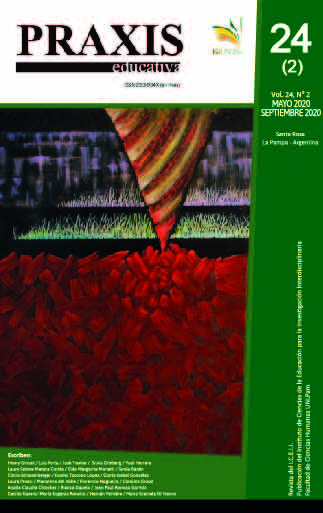The chair: a form of organization of the university teaching function
DOI:
https://doi.org/10.19137/DOI:%20https://dx.doi.org/10.19137/praxiseducativa-2020-240205Keywords:
university chair, university education, college, university organization.Abstract
Institutions aimed to a social function fulfillment. To do this the institutions are specified in an organization, with its space, its time and through a distribution of responsibilities and tasks. In Argentine history and tradition, teaching as a function is usually assigned to the university chair. Chairs are generally named after the subject or knowledge field that is taught, which highlights the importance of this function. Although this article falls within the results of our research on the teaching styles of the university chair, this form of organization was already presented as a relevant notion in our previous studies located in the field
of university didactics. The objectives of this work are to analyze the senses and meanings attributed to the university chair, as well as to present the institutional and pedagogical – teaching aspects that constitute it.
Downloads
References
Barnett, R. (2007). A will to learn. England: Mc Graw Hill.
Barnett, R. (2008). Introducción. En R. Barnett, Para una transformación de la universidad. España: Octaedro.
Barnett, R. (2009). Foreword. En C. Kreber, The university and its disciplines. UK: Routledge.
Becher, T. (2001). Tribus y Territorios Académicos. Barcelona: Gedisa.
Bourdieu, P. y Passeron, J. C. (2003). Los herederos. Argentina: Siglo XXI.
Chiroleu, A. (2002). La profesión académica en Argentina. Revista (Syn)Thesis, 7, 41-52.
Clark, B. (1983). El sistema de educación superior. México: Nueva Imagen.
Corominas, J. y Pascual, J. A. (1984). Diccionario Crítico etimológico Castellano e Hispánico. Tomo I. España: Gredos.
Coulon, A. (1993). Etnometodología y educación. Buenos Aires: Paidós.
Decreto 1246/2015, Convenio Colectivo para Docentes de las Instituciones Universitarias Nacionales. Argentina: Dirección Nacional del Registro Oficial.
Donald, G. J. (2009). The Commons: Disciplinary and interdisciplinary encounters. En C. Kreber (edit.), The university and its disciplines. UK: Routledge. 35-49.
Enriquez, E. (1980). Les institutions: amour et contrainte, consensus et violence. París: Conexiones. EPI.
Fanghanel, J. (2012). Being an academic. United Kingdon: Routledge.
Fernández, L. (1994). Instituciones Educativas. Buenos Aires: Paidós.
Fernández, L. (1990). Análisis institucional de cátedras. Informe de investigación.
Kreber, C. (2009). The university and its disciplines. United Kingdom: Routledge.
Marquina, M. y Fernandez Lamarra, N. (2008). The Academic Profession in Argentina: characteristics and trends in the context of a mass higher education system. En Hiroshima University Research Institute for Higher Education The Changing Academic Profession in International Comparative and Quantitative Perspectives. Recuperado el 24 de mayo de 2012 de http://en.rihe.hiroshima-u.ac.jp/
Martin, E. (2009). Profesorado competente para formar alumnado competente: El reto del cambio docente.En J. Pozo y M. Pérez Echeverría, Psicología del aprendizaje universitario: la formación en competencias, 199- 216. Madrid: Morata.
Mélich, J. C. (2006). Transformaciones. Tres ensayos de filosofía de la educación. Buenos Aires:: Miño y Dávila.
Menges, R y Austin, A. (2002). Teaching in Higher education. En V. Richardson. (Ed.), Handbook of research on teaching (4th ed., pp. 1122–1156). Washington, DC: American Educational Research Association
Monetti, E. (2003a). El saber didáctico y la relación con el saber del docente de la Universidad Nacional del Sur (tesis de maestría). Concepción del Uruguay: Universidad Nacional de Entre Ríos (no publicado).
Monetti, E. (2003b). El saber didáctico: sus significados. 3er Congreso Nacional, 1ero Internacional de Investigación Educativa. Facultad de Ciencias de la Educación, Universidad Nacional del Comahue, Cipolletti.
Monetti, E. (2015). La didáctica de la cátedra universitaria. Novedades Educativas: Buenos Aires.
Pacheco, M. (2004). Reflexiones en torno a la construcción del espacio de la extensión universitaria hoy. La Universidad como Espacio Público, 3(3): Córdoba.
Quiroga, S. E. (1998). Adolescencia: del goce orgánico al hallazgo del objeto. Buenos Aires: Eudeba.
Rama, C. (2006). La tercera reforma de la educación superior en América Latina. Argentina: FCE.
Rama, C. (2009). La tendencia a la masificación de la cobertura de la educación superior en América Latina.
Revista Ibero-Americana de Educação, 50, 173-195.
Schön, D. (1992). La formación de profesionales reflexivos. Madrid: Paidós.
Van Manen, M. (2011). Phenomenology online. Recuperado de: http://www.phenomenologyonline.com/
Wittrock, B. (1996). Las tres transformaciones de la universidad moderna. En S. Rothblatt y B. Wittrock (Comp.), La Universidad europea y americana desde 1800: las tres transformaciones de la universidad moderna. Barcelona: Pomares-Corredor.
Downloads
Published
Issue
Section
License
Copyright Notice
Editorial Committee Educational Praxis Magazine:
I hereby declare that I am the author of the article titled (article name), that it is original and my own and that it was not previously published in any other format or medium. I declare to know that the magazine will not charge me any type of fee under any circumstances, nor will I receive any type of monetary compensation If it were accepted for publication in Educational Praxis, I authorize the aforementioned magazine to publish it digitally and to advertise it on its social networks.
If the work is published, I adhere to the Creative Commons license called "Attribution - Non-Commercial Share Alike CC BY-NC-SA", through which it is allowed to copy, reproduce, distribute, publicly communicate the work and generate derivative works, as long as when the original author is cited and acknowledged. This license has been used since September 2018. In 2016 CC BY NC ND 4.0 was adhered to; and in the years 2017 and 2018 (January-August) CC BY NC 4.0.
This CC BY-NC-SA Share Alike license does not, however, permit commercial use of the work. As an author, the journal may establish additional agreements for the non-exclusive distribution of the version of the work published in the journal, it allows me to self-archive the published articles, in their post-print version, in institutional, thematic repositories, personal web pages or any other relevant use. with the recognition of having been first published in this journal.
Educational Praxis adheres to DORA (Declaration on Research Assessment) signed in San Francisco, California, on December 16, 2012, and to the Declaration of Mexico (Joint Declaration LATINDEX - REDALYC - CLACSO - IBICT).















_(1)2.png)


3.png)











_(2).png)






2.jpg)









